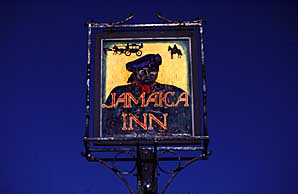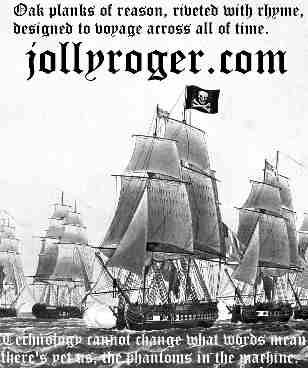|
For
most people Smuggling conjures up romantic and adventurous
scenes of Sussex and Cornish men bringing their illicit cargos
to land upon the quiet and deserted shore havens. Or
perhaps the picture is of swarthy, furtive figures dashing like
elusive fairies between the rays of the full moon into the
shadowy safety of the trees!
Whatever
your perception of the men who plied this trade in days gone by,
you can be sure the trade was carried out enthusiastically
by persons from all walks of life and looked upon as a
respectable way of earning a living. The
height of the smuggling days were in the 1500 to 1800's but
began much earlier in the 1200's, not with the importation of
goods into England, but with taking them out.

Further
to this, the type of goods being smuggled out of England at that
time had nothing to do with fine cloth, spirits, or such, but
with sheep's wool. Indeed, smuggling started in earnest in
the reign of Edward I, about 1300, when a customs duty was
placed on the export of wool, which was in great demand in
Europe. This was the first permanent customs system established
in England, and until it was set up all trade in and out of
England was free. The initial duties started quite small,
but as the Hundred Years War progressed, so the tax went up, to
help pay for the troops and fighting.
Initially the Customs Service was only there to collect the
duties at the ports, and not to prevent smuggling. Chichester
was the only port in Sussex where importing and exporting goods
was allowed. However the merchants of our area found it easier
to land the goods in the local Cinque
Ports where there were few Customs Officials.
In 1357 a court was held in Rye
to try a number of merchants who were smuggling goods through
the port of Pevensey.
In 1614, the export of any wool was made illegal, and so the
volumes being exported increased the smuggling
of wool was known as Owling (After the owl like noises
made by the smugglers
to communicate with each other). As time went on and the smuggling
became more profitable, so the smugglers
were able to bribe more of the port officials, which in turn
allowed more smuggling.
In 1661 the illegal exporting of wool was made punishable by the
death sentence, this meant that the smugglers
started to arm themselves, and the only way they could be
stopped was by the army. Before 1671 the collection of
Customs Duties was generally let out to private individuals.
During 1671 Charles II created the the Board of Customs.
The Romney Marshes became the centre of smuggling
and the records show that in the 1670's 20,000 packs of wool
were sent to Calais annually. The smugglers
were now building fast and armed ships to carry out their
nocturnal runs.
During the 1680's the Revenue Officers were provided with
Customs sloops to enable them to patrol the coasts, and catch
the smugglers.
In 1698 the government decided to take action. An Act was passed
stopping people within 15 miles of the sea from buying any wool,
unless they guaranteed that they wouldn't sell it to anyone
within 15 miles of the sea. Also any farmers within 10 miles of
the sea had to account for their fleeces within 3 days of
shearing. A further change was the introduction of a number of
officials who were paid to prevent smuggling. The initial effect
of these officers was to limit the smuggling
of wool which they had sent into serious decline by 1703, but
the officials became corrupt, and smuggling
returned.

In 1714, the local records show that the majority of the
population within the area was involved with smuggling. The main
wool smugglers
( owlers
) from 1710 in the area were the Mayfield
Gang , but they were stopped by their leader being arrested
in 1721. By 1724, the number of wool smuggling
runs was reducing , as the French could get wool from Ireland
for about the same price, but with less problems.
The 1730's brought the major smugglers
into the area , 1733 the Groombridge
Gang started smuggling
tea and brandy through the Ashdown Forest .
Between
1735 and 1749 the area was terrorised by the Hawkhurst
Gang , who controlled the smuggling
in a large part of the south coast. Originally known as the
Holkhourst Genge, they were based in the Oak and Ivy Inn in the
village of Hawkhurst
on the Kent border. They roamed from Herne Bay to Poole in
Dorset, but they frequented the Mermaid Inn in Rye, where they
"would sit and drink with loaded pistols on the
table". A further reference to the gang was in 1740, at
Silver Hill in Robertsbridge
where Thomas Carswell (a customs officer) was shot and killed
while trying to apprehend some of the smugglers. One of the
guilty smugglers
George Chapman was gibbetted on the Village Green in the village
of Hurst
Green .
In 1784 the duty on tea and French wines was reduced by the
government, removing the incentive to smuggle these items, but
those for spirits and tobacco still remained.
The Napoleonic Wars 1797 - 1815 saw a number of increases in
duty to try to pay for the War,
but this along with the decline in the local Iron Industry
provided more reasons and better incentives to smuggle.

The Aldington
Gang probably formed by soldiers returning from the
Napoleonic Wars survived until 1827 when their leaders were
found guilty and transported.
In 1831 the Coastguard took over the coastal policing, and from
1832-33 a number of violent events occured, culminating with a
fight at Pevensey
in 1833, which seemed to be the end of the smuggling
in this area.
Through
the years, the nature of smuggling changed and adapted according
to the laws at the time and the taxes payable on the goods
concerned along with the scarcity of the items. Smuggling, far
from being a trade for heinous villains was looked upon by most
of the population as being a fair and honest way of making ones
way in the world.
Even
in modern times smuggling has survived and today an illicit
trade in spirits, beers, wines, tobacco and even humans operates
every day. Although it must be said that when one buys
contraband today you only take away an income from the
government which in turn removes the benefits of such taxation
from the good of the people - provided or course your government
uses it resources wisely - and on this point you may have other
thoughts.
For
sure, the days of smuggling being thought a respectable trade
have long since ceased to be.
Rudyard Kipling from Burwash
wrote a poem about the smugglers
The Smugglers Song
If
You wake at midnight, and hear a horse's feet,
Don't go drawing back the blind, or looking in the street,
Them that asks no questions isn't told a lie.
Watch the wall, my darling, while the Gentlemen go by!
Five-and-twenty
ponies,
Trotting through the dark - Brandy for the Parson,
'Baccy for the Clerk;
Laces for a lady; letters for a spy,
And watch the wall, my darling, while the Gentlemen go by!
Running
round the woodlump if you chance to find
Little barrels, roped and tarred, all full of brandy-wine;
Don't you shout to come and look, nor take 'em for your play;
Put the brushwood back again, - and they'll be gone next day!
If you see the stable-door setting open wide;
If you see a tired horse lying down inside;
If your mother mends a coat cut about and tore;
If the lining's wet and warm - don't you ask no more!
If
you meet King
George's men, dressed in blue and red,
You be careful what you say, and mindful what is said.
If they call you 'pretty maid,' and chuck you 'neath the chin,
Don't you tell where no one is, nor yet where no one's been!
Knocks
and footsteps round the house - whistles after dark -
You've no call for running out till the house-dogs bark.
Trusty's here, and Pincher's here, and see how dumb they lie -
They don't fret to follow when the Gentlemen go by!
If
you do as you've been told, likely there's a chance
You'll be give a dainty doll, all the way from France,
With a cap of Valenciennes, and a velvet hood -
A present from the Gentlemen, along o' being good!
Five-and-twenty
ponies,
Trotting through the dark -
Brandy for the Parson,
'Baccy for the Clerk.
Them that asks no questions isn't told a lie -
Watch the wall, my darling, while the Gentlemen go by!
Ask anyone
to describe a British smuggler from the 19th century, and
they’ll probably tell you he is a Sussex or Cornish man
dressed in long boots and a striped jersey. He rolls a dozen
kegs up a moonlit beach, hides them in a cave, then hawks
the brandy round the village. Everybody knows him as
Tom the Smuggler, and his neighbours take it in turns to
distract the revenue man at the front door while Tom rolls
his barrels out the back.
But how
accurate is this picture of the smuggler? It is misleading
because it omits important and unsavoury details about the
smuggling trade. In some ways, it's hopelessly romanticised.
Nevertheless, this thumbnail sketch contains a few grains of
truth, and it successfully evokes the extraordinary
circumstances which permitted a vast expansion of illegal
imports.
This
"free trade" mushroomed in the 18th century.
Small-scale evasion of duty turned into a major industry,
siphoning money abroad, and channelling huge volumes of
contraband in the other direction.
Even by
modern standards, the smugglers imported goods in
extraordinary quantities. 80 percent of all tea drunk in
England had not paid duty; a single smuggling trip could
bring in 3,000 gallons of spirits; illegally imported gin
was so cheap that it was used for cleaning windows.
Whole
communities connived in the trade. A large cargo sometimes
drained all available cash from the area where it landed,
and there are numerous instances of villages uniting to
fight the customs men and reclaim cargoes they had seized.
THE
SMUGGLERS TRAIL
The
interesting story and history of smuggling in the south west
of England
Visit
the towns, villages, resorts, bays, coves and caves that
tell the story of men who pit their wits and seamanship
against the Commissioners of His/Her Majesty's Customs, the
revenue men, pirates and privateers. Adults will find
the history interesting, Children will be exited with the
tales, caves, haunts and locations.
The
trail covers the coast of the south west of England, UK
commencing at Weston-super-Mare to the north (near Bristol),
along the Bristol Channel coast line to Lands End and then
along the south coast line to Poole. You will travel through
Somerset, Devon, Cornwall and Dorset.
|


